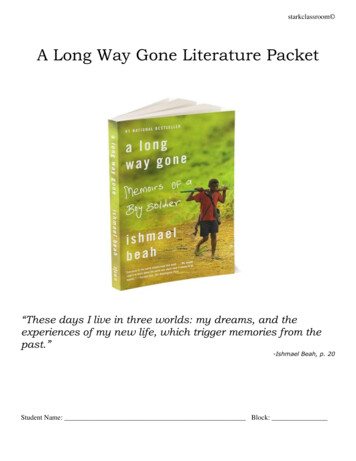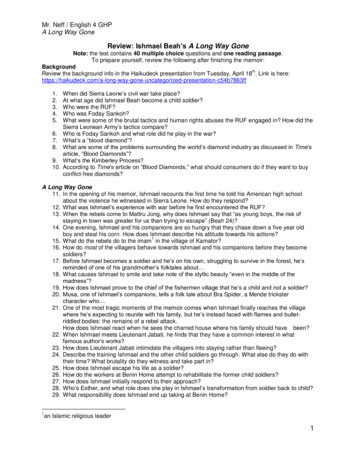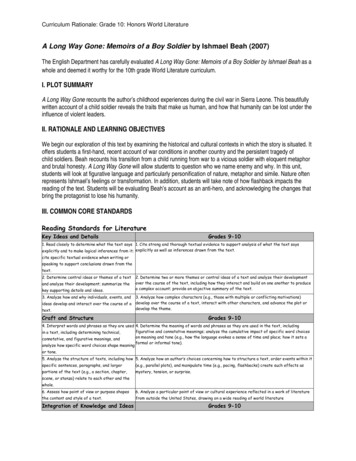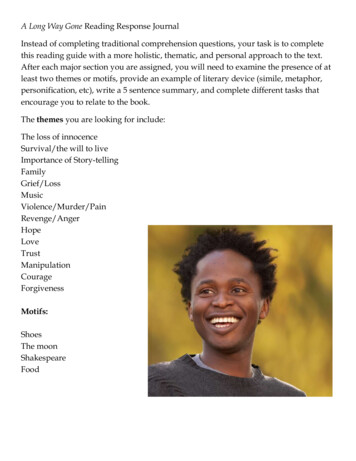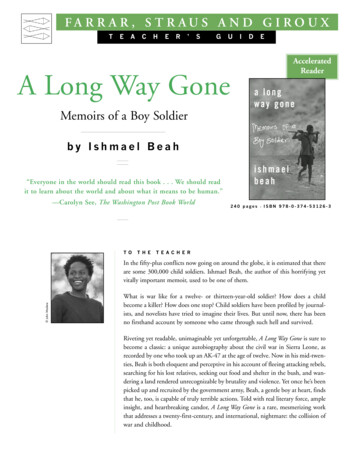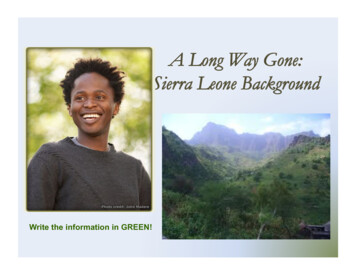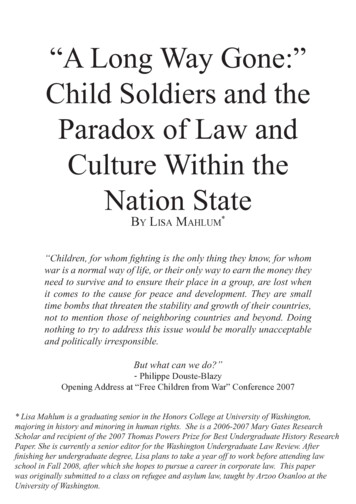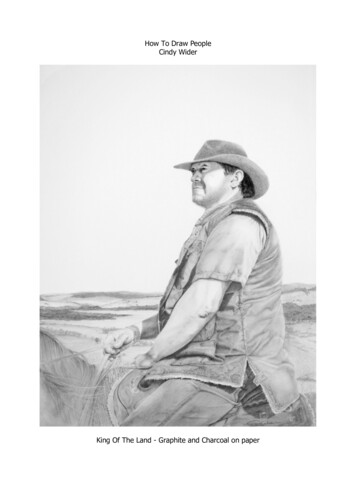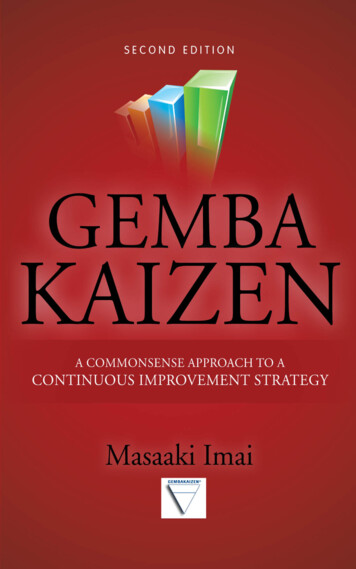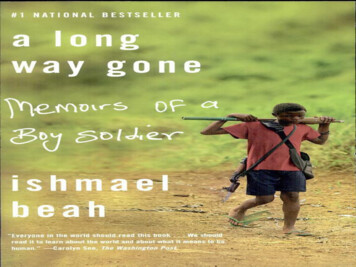
Transcription
Praise for A LONG WAY GONE“Beah speaks in a distinctive voice, and he tells an important story.”—JOHN CORRY, The Wall Street Journal“Americans tend to regard African conflicts as somewhat vague events signified byhorrendous concepts—massacres, genocide, mutilation—that are best kept safely at adistance. Such a disconnect might prove impossible after reading A Long Way Gone , aclear-eyed, undeniably compelling look at wartime violence Gone finds its power in therevelation that under the right circumstances, people of any age can find themselves doingthe most unthinkable things.”—GILBERT CRUZ, Entertainment Weekly“His honesty is exacting, and a testament to the ability of children ‘to outlive their sufferings,if given a chance.’”—The New Yorker“This absorbing account goes beyond even the best journalistic efforts in revealing the lifeand mind of a child abducted into the horrors of warfare Told in clear, accessiblelanguage by a young writer with a gifted literary voice, this memoir seems destined tobecome a classic firsthand account of war and the ongoing plight of child soldiers inconflicts worldwide.”—Publishers Weekly (starred review)
“Deeply moving, even uplifting Beah’s story, with its clear-eyed reporting and literateparticularity—whether he’s dancing to rap, eating a coconut or running toward the burningvillage where his family is trapped—demands to be read.”—LIZA NELSON, People (Critic’s Choice, four stars)“Beah is a gifted writer Read his memoir and you will be haunted It’s a high price topay, but it’s worth it.”—MALCOLM JONES, Newsweek.com“When Beah is finally approached about the possibility of serving as a spokesperson on theissue of child soldiers, he knows exactly what he wants to tell the world ‘I would alwaystell people that I believe children have the resilience to outlive their sufferings, if given achance.’ Others may make the same assertions, but Beah has the advantage of stating them inthe first person. That makes A Long Way Gone all the more gripping.”—CAROL HUANG, The Christian Science Monitor“In place of a text that has every right to be a diatribe against Sierra Leone, globalization oreven himself, Beah has produced a book of such self-effacing humanity A Long Way Gonetransports us into the lives of thousands of children whose lives have been altered by war,and it does so with a genuine and disarmingly emotional force.”—RICHARD THOMPSON, Star Tribune (Minneapolis)“It would have been enough if Ishmael Beah had merely survived the horrors described in ALong Way Gone . That he has written this unforgettable firsthand account of his odyssey is
harder still to grasp. Those seeking to understand the human consequences of war, its brutaland brutalizing costs, would be wise to reflect on Ishmael Beah’s story.”—CHUCK LEDDY, The Philadelphia Inquirer“Beah’s memoir is off the charts in its harrowing depictions of cruelty and depravity. Whatsaves it from being a gratuitous immersion in violence is his brilliant writing, his compellingnarrator’s voice, his gift for telling detail This war memoir haunts the heart long after theeyes have finished the final page.”—JOHN MARSHALL, Seattle Post-Intelligencer“That Beah survived at all, let alone survived with any capacity for hope and joy at all, isstunning, and testament to incredible courage That Beah could then craft a memoir likethis, in his second language no less, is astounding and even thrilling, for A Long Way Goneis a taut prose arrow against the twisted lies of wars.”—BRIAN DOYLE, The Oregonian“Beah writes his story with painful honesty, horrifying detail, and touches of remarkablelyricism A must for every school collection.”—RAYNA PATTON, VOYA“A Long Way Gone is one of the most important war stories of our generation IshmaelBeah has not only emerged intact from this chaos, he has become one of its most eloquentchroniclers. We ignore his message at our peril.”—SEBASTIAN JUNGER, author of The Perfect Storm: A True Story of Men Against the Sea
“This is a beautifully written book. Ishmael Beah describes the unthinkable in calm,unforgettable language.”—STEVE COLL, author of Ghost Wars: The Secret History of the CIA, Afghanistan, and BinLaden, from the Soviet Invasion to September 10, 2001“A Long Way Gone is a wrenching, beautiful, and mesmerizing tale. Beah’s amazing sagaprovides a haunting lesson about how gentle folks can be capable of great brutalities as wellas goodness and courage. It will leave you breathless.”—WALTER ISAACSON, author of Einstein: His Life and Universe
ISHMAEL BEAHA LONG WAY GONEIshmael Beah was born in Sierra Leone in 1980. He moved to the United States in 1998 andfinished his last two years of high school at the United Nations International School in NewYork. He graduated from Oberlin College in 2004. He is a member of the Human RightsWatch Children’s Rights Division Advisory Committee and has spoken before the UnitedNations, the Council on Foreign Relations, the Center for Emerging Threats andOpportunities (CETO) at the Marine Corps Warfighting Laboratory, and many other NGOpanels on children affected by war. He is also the head of the Ishmael Beah Foundation,which is dedicated to helping former child soldiers reintegrate into society and improvetheir lives. His work has appeared in VespertinePress and LIT magazine. He lives inBrooklyn.
A LONG WAY GONEMemoirs of a Boy SoldierISHMALEL BEAHSARAH CRICHTON BOOKSFarrar, Straus and GirouxNew York
To the memories ofNya Nje, Nya Keke,Nya Ndig-ge sia, and Kaynya.Your spirits and presence within megive me strength to carry on,to all the children of Sierra Leonewho were robbed of their childhoods,andto the memory of Walter (Wally) Scheuerfor his generous and compassionate heartand for teaching me the etiquette ofbeing a gentleman
A LONG WAY GONE
New York City, 1998MY HIGH SCHOOL FRIENDS have begun to suspect I haven’t told them the full story of my life.“Why did you leave Sierra Leone?”“Because there is a war.”“Did you witness some of the fighting?”“Everyone in the country did.”“You mean you saw people running around with guns and shooting each other?”“Yes, all the time.”“Cool.”I smile a little.“You should tell us about it sometime.”“Yes, sometime.”
ContentsChapter 1Chapter 2Chapter 3Chapter 4Chapter 5Chapter 6Chapter 7Chapter 8Chapter 9Chapter 10Chapter 11Chapter 12
Chapter 13Chapter 14Chapter 15Chapter 16Chapter 17Chapter 18Chapter 19Chapter 20Chapter 21ChronologyAcknowledgments
1THERE WERE ALL KINDS of stories told about the war that made it sound as if it washappening in a faraway and different land. It wasn’t until refugees started passing throughour town that we began to see that it was actually taking place in our country. Families whohad walked hundreds of miles told how relatives had been killed and their houses burned.Some people felt sorry for them and offered them places to stay, but most of the refugeesrefused, because they said the war would eventually reach our town. The children of thesefamilies wouldn’t look at us, and they jumped at the sound of chopping wood or as stoneslanded on the tin roofs flung by children hunting birds with slingshots. The adults amongthese children from the war zones would be lost in their thoughts during conversations withthe elders of my town. Apart from their fatigue and malnourishment, it was evident they hadseen something that plagued their minds, something that we would refuse to accept if theytold us all of it. At times I thought that some of the stories the passersby told wereexaggerated. The only wars I knew of were those that I had read about in books or seen inmovies such as Rambo: First Blood, and the one in neighboring Liberia that I had heardabout on the BBC news. My imagination at ten years old didn’t have the capacity to graspwhat had taken away the happiness of the refugees.The first time that I was touched by war I was twelve. It was in January of 1993. I left home
with Junior, my older brother, and our friend Talloi, both a year older than I, to go to thetown of Mattru Jong, to participate in our friends’ talent show. Mohamed, my best friend,couldn’t come because he and his father were renovating their thatched-roof kitchen that day.The four of us had started a rap and dance group when I was eight. We were first introducedto rap music during one of our visits to Mobimbi, a quarter where the foreigners whoworked for the same American company as my father lived. We often went to Mobimbi toswim in a pool and watch the huge color television and the white people who crowded thevisitors’ recreational area. One evening a music video that consisted of a bunch of youngblack fellows talking really fast came on the television. The four of us sat there mesmerizedby the song, trying to understand what the black fellows were saying. At the end of the video,some letters came up at the bottom of the screen. They read “Sugarhill Gang, ‘Rapper’sDelight.’” Junior quickly wrote it down on a piece of paper. After that, we came to thequarters every other weekend to study that kind of music on television. We didn’t know whatit was called then, but I was impressed with the fact that the black fellows knew how tospeak English really fast, and to the beat.Later on, when Junior went to secondary school, he befriended some boys who taughthim more about foreign music and dance. During holidays, he brought me cassettes andtaught my friends and me how to dance to what we came to know as hip-hop. I loved thedance, and particularly enjoyed learning the lyrics, because they were poetic and itimproved my vocabulary. One afternoon, Father came home while Junior, Mohamed, Talloi,and I were learning the verse of “I Know You Got Soul” by Eric B. & Rakim. He stood bythe door of our clay brick and tin roof house laughing and then asked, “Can you evenunderstand what you are saying?” He left before Junior could answer. He sat in a hammock
under the shade of the mango, guava, and orange trees and tuned his radio to the BBC news.“Now, this is good English, the kind that you should be listening to,” he shouted fromthe yard.While Father listened to the news, Junior taught us how to move our feet to the beat. Wealternately moved our right and then our left feet to the front and back, and simultaneouslydid the same with our arms, shaking our upper bodies and heads. “This move is called therunning man,” Junior said. Afterward, we would practice miming the rap songs we hadmemorized. Before we parted to carry out our various evening chores of fetching water andcleaning lamps, we would say “Peace, son” or “I’m out,” phrases we had picked up from therap lyrics. Outside, the evening music of birds and crickets would commence.On the morning that we left for Mattru Jong, we loaded our backpacks with notebooks oflyrics we were working on and stuffed our pockets with cassettes of rap albums. In thosedays we wore baggy jeans, and underneath them we had soccer shorts and sweatpants fordancing. Under our long-sleeved shirts we had sleeveless undershirts, T-shirts, and soccer*jerseys. We wore three pairs of socks that we pulled down and folded to make our crapeslook puffy. When it got too hot in the day, we took some of the clothes off and carried themon our shoulders. They were fashionable, and we had no idea that this unusual way ofdressing was going to benefit us. Since we intended to return the next day, we didn’t saygoodbye or tell anyone where we were going. We didn’t know that we were leaving home,never to return.To save money, we decided to walk the sixteen miles to Mattru Jong. It was a beautiful
summer day, the sun wasn’t too hot, and the walk didn’t feel long either, as we chatted aboutall kinds of things, mocked and chased each other. We carried slingshots that we used tostone birds and chase the monkeys that tried to cross the main dirt road. We stopped atseveral rivers to swim. At one river that had a bridge across it, we heard a passengervehicle in the distance and decided to get out of the water and see if we could catch a freeride. I got out before Junior and Talloi, and ran across the bridge with their clothes. Theythought they could catch up with me before the vehicle reached the bridge, but upon realizingthat it was impossible, they started running back to the river, and just when they were in themiddle of the bridge, the vehicle caught up to them. The girls in the truck laughed and thedriver tapped his horn. It was funny, and for the rest of the trip they tried to get me back forwhat I had done, but they failed.We arrived at Kabati, my grandmother’s village, around two in the afternoon. MamieKpana was the name that my grandmother was known by. She was tall and her perfectly longface complemented her beautiful cheekbones and big brown eyes. She always stood with herhands either on her hips or on her head. By looking at her, I could see where my mother hadgotten her beautiful dark skin, extremely white teeth, and the translucent creases on her neck.My grandfather or kamor—teacher, as everyone called him—was a well-known localArabic scholar and healer in the village and beyond.At Kabati, we ate, rested a bit, and started the last six miles. Grandmother wanted us tospend the night, but we told her that we would be back the following day.“How is that father of yours treating you these days?” she asked in a sweet voice thatwas laden with worry.“Why are you going to Mattru Jong, if not for school? And why do you look so skinny?”
she continued asking, but we evaded her questions. She followed us to the edge of thevillage and watched as we descended the hill, switching her walking stick to her left hand sothat she could wave us off with her right hand, a sign of good luck.We arrived in Mattru Jong a couple of hours later and met up with old friends, Gibrilla,Kaloko, and Khalilou. That night we went out to Bo Road, where street vendors sold foodlate into the night. We bought boiled groundnut and ate it as we conversed about what wewere going to do the next day, made plans to see the space for the talent show and practice.We stayed in the verandah room of Khalilou’s house. The room was small and had a tinybed, so the four of us (Gibrilla and Kaloko went back to their houses) slept in the same bed,lying across with our feet hanging. I was able to fold my feet in a little more since I wasshorter and smaller than all the other boys.The next day Junior, Talloi, and I stayed at Khalilou’s house and waited for our friendsto return from school at around 2:00 p.m. But they came home early. I was cleaning mycrapes and counting for Junior and Talloi, who were having a push-up competition. Gibrillaand Kaloko walked onto the verandah and joined the competition. Talloi, breathing hard andspeaking slowly, asked why they were back. Gibrilla explained that the teachers had toldthem that the rebels had attacked Mogbwemo, our home. School had been canceled untilfurther notice. We stopped what we were doing.According to the teachers, the rebels had attacked the mining areas in the afternoon. Thesudden outburst of gunfire had caused people to run for their lives in different directions.Fathers had come running from their workplaces, only to stand in front of their empty houses
with no indication of where their families had gone. Mothers wept as they ran towardschools, rivers, and water taps to look for their children. Children ran home to look forparents who were wandering the streets in search of them. And as the gunfire intensified,people gave up looking for their loved ones and ran out of town.“This town will be next, according to the teachers.” Gibrilla lifted himself from thecement floor. Junior, Talloi, and I took our backpacks and headed to the wharf with ourfriends. There, people were arriving from all over the mining area. Some we knew, but theycouldn’t tell us the whereabouts of our families. They said the attack had been too sudden,too chaotic; that everyone had fled in different directions in total confusion.For more than three hours, we stayed at the wharf, anxiously waiting and expectingeither to see our families or to talk to someone who had seen them. But there was no news ofthem, and after a while we didn’t know any of the people who came across the river. Theday seemed oddly normal. The sun peacefully sailed through the white clouds, birds sangfrom treetops, the trees danced to the quiet wind. I still couldn’t believe that the war hadactually reached our home. It is impossible, I thought. When we left home the day before,there had been no indication the rebels were anywhere near.“What are you going to do?” Gibrilla asked us. We were all quiet for a while, and thenTalloi broke the silence. “We must go back and see if we can find our families before it istoo late.”Junior and I nodded in agreement.Just three days earlier, I had seen my father walking slowly from work. His hard hat was
under his arm and his long face was sweating from the hot afternoon sun. I was sitting on theverandah. I had not seen him for a while, as another stepmother had destroyed ourrelationship again. But that morning my father smiled at me as he came up the steps. Heexamined my face, and his lips were about to utter something, when my stepmother came out.He looked away, then at my stepmother, who pretended not to see me. They quietly went intothe parlor. I held back my tears and left the verandah to meet with Junior at the junctionwhere we waited for the lorry. We were on our way to see our mother in the next town aboutthree miles away. When our father had paid for our school, we had seen her on weekendsover the holidays when we were back home. Now that he refused to pay, we visited herevery two or three days. That afternoon we met Mother at the market and walked with her asshe purchased ingredients to cook for us. Her face was dull at first, but as soon as shehugged us, she brightened up. She told us that our little brother, Ibrahim, was at school andthat we would go get him on our way from the market. She held our hands as we walked, andevery so often she would turn around as if to see whether we were still with her.As we walked to our little brother’s school, Mother turned to us and said, “I am sorry Ido not have enough money to put you boys back in school at this point. I am working on it.”She paused and then asked, “How is your father these days?”“He seems all right. I saw him this afternoon,” I replied. Junior didn’t say anything.Mother looked him directly in the eyes and said, “Your father is a good man and heloves you very much. He just seems to attract the wrong stepmothers for you boys.”When we got to the school, our little brother was in the yard playing soccer with hisfriends. He was eight and pretty good for his age. As soon as he saw us, he came running,throwing himself on us. He measured himself against me to see if he had gotten taller than
me. Mother laughed. My little brother’s small round face glowed, and sweat formed aroundthe creases he had on his neck, just like my mother’s. All four of us walked to Mother’shouse. I held my little brother’s hand, and he told me about school and challenged me to asoccer game later in the evening. My mother was single and devoted herself to taking care ofIbrahim. She said he sometimes asked about our father. When Junior and I were away inschool, she had taken Ibrahim to see him a few times, and each time she had cried when myfather hugged Ibrahim, because they were both so happy to see each other. My motherseemed lost in her thoughts, smiling as she relived the moments.Two days after that visit, we had left home. As we now stood at the wharf in MattruJong, I could visualize my father holding his hard hat and running back home from work, andmy mother, weeping and running to my little brother’s school. A sinking feeling overtook me.Junior, Talloi, and I jumped into a canoe and sadly waved to our friends as the canoe pulledaway from the shores of Mattru Jong. As we landed on the other side of the river, more andmore people were arriving in haste. We started walking, and a woman carrying her flipflops on her head spoke without looking at us: “Too much blood has been spilled where youare going. Even the good spirits have fled from that place.” She walked past us. In thebushes along the river, the strained voices of women cried out, “Nguwor gbor mu ma oo,”God help us, and screamed the names of their children: “Yusufu, Jabu, Foday ” We sawchildren walking by themselves, shirtless, in their underwear, following the crowd. “Nyanje oo, nya keke oo,” my mother, my father, the children were crying. There were also dogsrunning, in between the crowds of people, who were still running, even though far away
from harm. The dogs sniffed the air, looking for their owners. My veins tightened.We had walked six miles and were now at Kabati, Grandmother’s village. It was deserted.All that was left were footprints in the sand leading toward the dense forest that spread outbeyond the village.As evening approached, people started arriving from the mining area. Their whispers,the cries of little children seeking lost parents and tired of walking, and the wails of hungrybabies replaced the evening songs of crickets and birds. We sat on Grandmother’s verandah,waiting and listening.“Do you guys think it is a good idea to go back to Mogbwemo?” Junior asked. Butbefore either of us had a chance to answer, a Volkswagen roared in the distance and all thepeople walking on the road ran into the nearby bushes. We ran, too, but didn’t go that far.My heart pounded and my breathing intensified. The vehicle stopped in front of mygrandmother’s house, and from where we lay, we could see that whoever was inside the carwas not armed. As we, and others, emerged from the bushes, we saw a man run from thedriver’s seat to the sidewalk, where he vomited blood. His arm was bleeding. When hestopped vomiting, he began to cry. It was the first time I had seen a grown man cry like achild, and I felt a sting in my heart. A woman put her arms around the man and begged him tostand up. He got to his feet and walked toward the van. When he opened the door oppositethe driver’s, a woman who was leaning against it fell to the ground. Blood was coming outof her ears. People covered the eyes of their children.In the back of the van were three more dead bodies, two girls and a boy, and their blood
was all over the seats and the ceiling of the van. I wanted to move away from what I wasseeing, but couldn’t. My feet went numb and my entire body froze. Later we learned that theman had tried to escape with his family and the rebels had shot at his vehicle, killing all hisfamily. The only thing that consoled him, for a few seconds at least, was when the womanwho had embraced him, and now cried with him, told him that at least he would have thechance to bury them. He would always know where they were laid to rest, she said. Sheseemed to know a little more about war than the rest of us.The wind had stopped moving and daylight seemed to be quickly giving in to night. Assunset neared, more people passed through the village. One man carried his dead son. Hethought the boy was still alive. The father was covered with his son’s blood, and as he ranhe kept saying, “I will get you to the hospital, my boy, and everything will be fine.” Perhapsit was necessary that he cling to false hopes, since they kept him running away from harm. Agroup of men and women who had been pierced by stray bullets came running next. The skinthat hung down from their bodies still contained fresh blood. Some of them didn’t notice thatthey were wounded until they stopped and people pointed to their wounds. Some fainted orvomited. I felt nauseated, and my head was spinning. I felt the ground moving, and people’svoices seemed to be far removed from where I stood trembling.The last casualty that we saw that evening was a woman who carried her baby on herback. Blood was running down her dress and dripping behind her, making a trail. Her childhad been shot dead as she ran for her life. Luckily for her, the bullet didn’t go through thebaby’s body. When she stopped at where we stood, she sat on the ground and removed herchild. It was a girl, and her eyes were still open, with an interrupted innocent smile on herface. The bullets could be seen sticking out just a little bit in the baby’s body and she was
swelling. The mother clung to her child and rocked her. She was in too much pain and shockto shed tears.Junior, Talloi, and I looked at each other and knew that we must re turn to Mattru Jong,because we had seen that Mogbwemo was no longer a place to call home and that ourparents couldn’t possibly be there anymore. Some of the wounded people kept saying thatKabati was next on the rebels’ list. We didn’t want to be there when the rebels arrived.Even those who couldn’t walk very well did their best to keep moving away from Kabati.The image of that woman and her baby plagued my mind as we walked back to Mattru Jong.I barely noticed the journey, and when I drank water I didn’t feel any relief even though Iknew I was thirsty. I didn’t want to go back to where that woman was from; it was clear inthe eyes of the baby that all had been lost.“You were negative nineteen years old.” That’s what my father used to say when I wouldask about what life was like in Sierra Leone following independence in 1961. It had been aBritish colony since 1808. Sir Milton Margai became the first prime minister and ruled thecountry under the Sierra Leone Peoples Party (SLPP) political banner until his death in1964. His half brother Sir Albert Margai succeeded him until 1967, when Siaka Stevens, theAll People’s Congress (APC) Party leader, won the election, which was followed by amilitary coup. Siaka Stevens returned to power in 1968, and several years later declared thecountry a one-party state, the APC being the sole legal party. It was the beginning of “rottenpolitics,” as my father would put it. I wondered what he would say about the war that I wasnow running from. I had heard from adults that this was a revolutionary war, a liberation of
the people from corrupt government. But what kind of liberation movement shoots innocentcivilians, children, that little girl? There wasn’t anyone to answer these questions, and myhead felt heavy with the images that it contained. As we walked, I became afraid of the road,the mountains in the distance, and the bushes on either side.We arrived in Mattru Jong late that night. Junior and Talloi explained to our friendswhat we had seen, while I stayed quiet, still trying to decide whether what I had seen wasreal. That night, when I finally managed to drift off, I dreamt that I was shot in my side andpeople ran past me without helping, as they were all running for their lives. I tried to crawlto safety in the bushes, but from out of nowhere there was someone standing on top of mewith a gun. I couldn’t make out his face as the sun was against it. That person pointed the gunat the place where I had been shot and pulled the trigger. I woke up and hesitantly touchedmy side. I became afraid, since I could no longer tell the difference between dream andreality.Every morning in Mattru Jong we would go down to the wharf for news from home. But aftera week the stream of refugees from that direction ceased and news dried up. Governmenttroops were deployed in Mattru Jong, and they erected checkpoints at the wharf and otherstrategic locations all over town. The soldiers were convinced that if the rebels attacked,they would come from across the river, so they mounted heavy artillery there and announceda 7:00 p.m. curfew, which made the nights tense, as we couldn’t sleep and had to be insidetoo early. During the day, Gibrilla and Kaloko came over. The six of us sat on the verandahand discussed what was going on.
“I do not think that this madness will last,” Junior said quietly. He looked at me as if toassure me that we would soon go home.“It will probably last for only a month or two.” Talloi stared at the floor.“I heard that the soldiers are already on their way to get the rebels out of the miningareas,” Gibrilla stammered. We agreed that the war was just a passing phase that wouldn’tlast over three months.Junior, Talloi, and I listened to rap music, trying to memorize the lyrics so that we couldavoid thinking about the situation at hand. Naughty by Nature, LL Cool J, Run-D.M.C., andHeavy D & The Boyz; we had left home with only these cassettes and the clothes that wewore. I remember sitting on the verandah listening to “Now That We Found Love” by HeavyD & The Boyz and watching the trees at the edge of town that reluctantly moved to the slowwind. The palms beyond them were still, as if awaiting something. I closed my eyes, and theimages from Kabati flashed in my mind. I tried to drive them out by evoking older memoriesof Kabati before the war.There was a thick forest on one side of the village where my grandmother lived and coffeefarms on the other. A river flowed from the forest to the edge of the village, passing throughpalm kernels into a swamp. Above the swamp banana farms stretched into the horizon. Themain dirt road that passed through Kabati was rutted with holes and puddles where ducksliked to bathe during the day, and in the backyards of the houses birds nested in mango trees.
In the morning, the sun would rise from behind the forest. First, its rays penetratedthrough the leaves, and gradually, with cockcrows and sparrows that vigorously proclaimeddaylight, the golden sun sat at the top of the forest. In the evening, monkeys could be seen inthe forest jumping from tree to tree, returning to their sleeping places. On the coffee farms,chickens were always busy hiding their young from hawks. Beyond the farms, palm treeswaved their fronds with the moving wind. Sometimes a palm wine tapper could be seenclimbing in the early evening.The evening ended with the
Praise for A LONG WAY GONE “Beah speaks in a distinctive voice, and he tells an important story.” —JOHN CORRY, The Wall Street Journal “Americans tend to regard African conflicts as somewhat vague events signified by horrendous concepts—massacres, genocide, mutilation—that are best kept safely at a distance.File Size: 1MBPage Count: 282Explore furtherA Long Way Gone Chapter 16 Flashcards Quizletquizlet.comOne of Us is Lying - WordPress.comclicklibrary.files.wordpress.comThe Boy Who Harnessed the Wind – Discussion Questionswww.raiareads.comThe Best of O. Henry Full Text - After Twenty Years - Owl Eyeswww.owleyes.orgA Lesson Before Dying - Peak Performance By Aligning The .www.communicationswithford Recommended to you b

